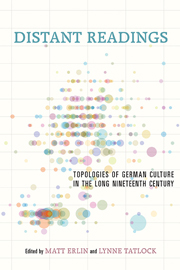21 results
12 - The Garb of National Literature: Transnational Identities and the Early Twentieth-Century Schriftstreit
-
-
- Book:
- German Literature as a Transnational Field of Production, 1848-1919
- Published by:
- Boydell & Brewer
- Published online:
- 10 January 2024
- Print publication:
- 13 June 2023, pp 250-269
-
- Chapter
- Export citation
3 - Weltdeutschtum: On the Notion of a German World Community from Schiller to Thomas Mann
-
-
- Book:
- German in the World
- Published by:
- Boydell & Brewer
- Published online:
- 06 October 2020
- Print publication:
- 25 June 2020, pp 57-72
-
- Chapter
- Export citation
Dietary assessment in the German National Cohort (GNC)
-
- Journal:
- Proceedings of the Nutrition Society / Volume 79 / Issue OCE2 / 2020
- Published online by Cambridge University Press:
- 10 June 2020, E85
-
- Article
-
- You have access
- Export citation
Only Skin Deep
- from Nexus Forum: A German Life: Edited and Introduced by Brad Prager
-
-
- Book:
- Nexus 4
- Published by:
- Boydell & Brewer
- Published online:
- 31 August 2018
- Print publication:
- 15 July 2018, pp 67-70
-
- Chapter
- Export citation
32 - The Poetics of Community: Thomas Mann, Joseph Conrad, Franz Kafka
- from Part IV - Modernism in Person, Modernism in Community
-
-
- Book:
- The Cambridge History of Modernism
- Published online:
- 21 January 2017
- Print publication:
- 11 January 2017, pp 610-625
-
- Chapter
- Export citation
I - Quantification
-
- Book:
- Distant Readings
- Published by:
- Boydell & Brewer
- Published online:
- 05 April 2014
- Print publication:
- 01 May 2014, pp 27-28
-
- Chapter
- Export citation
10 - The Vocations of the Novel: Distant-Reading Occupational Change in Nineteenth-Century German Literature
- from III - Contextualization
-
-
- Book:
- Distant Readings
- Published by:
- Boydell & Brewer
- Published online:
- 05 April 2014
- Print publication:
- 01 May 2014, pp 259-284
-
- Chapter
- Export citation
Frontmatter
-
- Book:
- Distant Readings
- Published by:
- Boydell & Brewer
- Published online:
- 05 April 2014
- Print publication:
- 01 May 2014, pp i-iv
-
- Chapter
- Export citation
Selected Bibliography
-
- Book:
- Distant Readings
- Published by:
- Boydell & Brewer
- Published online:
- 05 April 2014
- Print publication:
- 01 May 2014, pp 347-370
-
- Chapter
- Export citation
III - Contextualization
-
- Book:
- Distant Readings
- Published by:
- Boydell & Brewer
- Published online:
- 05 April 2014
- Print publication:
- 01 May 2014, pp 257-258
-
- Chapter
- Export citation
1 - Burrows's Delta and Its Use in German Literary History
- from I - Quantification
-
- Book:
- Distant Readings
- Published by:
- Boydell & Brewer
- Published online:
- 05 April 2014
- Print publication:
- 01 May 2014, pp 29-54
-
- Chapter
- Export citation
Acknowledgments
-
- Book:
- Distant Readings
- Published by:
- Boydell & Brewer
- Published online:
- 05 April 2014
- Print publication:
- 01 May 2014, pp vii-viii
-
- Chapter
- Export citation
Contents
-
- Book:
- Distant Readings
- Published by:
- Boydell & Brewer
- Published online:
- 05 April 2014
- Print publication:
- 01 May 2014, pp v-vi
-
- Chapter
- Export citation
Contributors
-
- Book:
- Distant Readings
- Published by:
- Boydell & Brewer
- Published online:
- 05 April 2014
- Print publication:
- 01 May 2014, pp 371-374
-
- Chapter
- Export citation
II - Circulation
-
- Book:
- Distant Readings
- Published by:
- Boydell & Brewer
- Published online:
- 05 April 2014
- Print publication:
- 01 May 2014, pp 153-154
-
- Chapter
- Export citation
Index
-
- Book:
- Distant Readings
- Published by:
- Boydell & Brewer
- Published online:
- 05 April 2014
- Print publication:
- 01 May 2014, pp 375-386
-
- Chapter
- Export citation

Distant Readings
- Topologies of German Culture in the Long Nineteenth Century
-
- Published by:
- Boydell & Brewer
- Published online:
- 05 April 2014
- Print publication:
- 01 May 2014
Plasma alkylresorcinol concentrations, biomarkers of whole-grain wheat and rye intake, in the European Prospective Investigation into Cancer and Nutrition (EPIC) cohort
-
- Journal:
- British Journal of Nutrition / Volume 111 / Issue 10 / 28 May 2014
- Published online by Cambridge University Press:
- 13 February 2014, pp. 1881-1890
- Print publication:
- 28 May 2014
-
- Article
-
- You have access
- HTML
- Export citation
3 - Germany
- from PART I - “CORE” MODERNISMS
-
-
- Book:
- The Cambridge Companion to European Modernism
- Published online:
- 28 September 2011
- Print publication:
- 08 September 2011, pp 33-51
-
- Chapter
- Export citation
On the Nature of the Bildungsroman
-
- Journal:
- PMLA / Publications of the Modern Language Association of America / Volume 124 / Issue 2 / March 2009
- Published online by Cambridge University Press:
- 23 October 2020, pp. 647-649
- Print publication:
- March 2009
-
- Article
- Export citation



